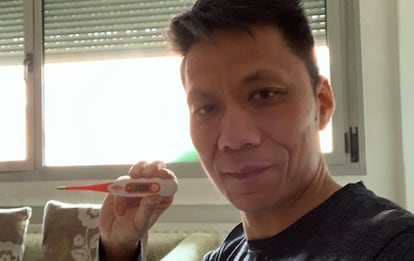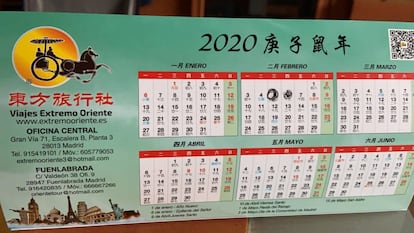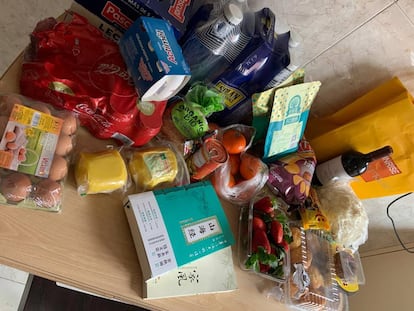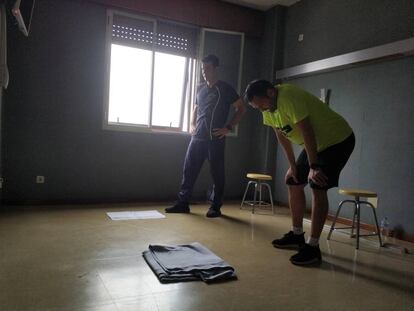The Chinese residents of Spain who are opting for a voluntary coronavirus quarantine
At least 61 citizens from China have chosen to shut themselves away for the two-week incubation period, after having returned from trips to their home country


When Nan Yong landed in Madrid on Wednesday, members of his family were waiting for him carrying face masks and the keys for two cars. Traveling in the first vehicle were the relatives who had come to welcome him after he spent several weeks in Wenzhou, China. Nan was in the other, headed for the house in which he is going to spend at least two weeks locked away alone. “It’s the only way to prevent a possible infection,” explains the 49-year-old wholesaler.
While Nan doesn’t believe that he has contracted the new coronavirus, which is behind an ongoing epidemic that has caused more than 560 deaths and has infected more than 28,100 people, he says that this approach is the most sensible one to take. “I’m shutting myself away in my house out of responsibility,” he says via telephone. “If I am sick, I don’t want to pass it on to anyone else.”
I’m shutting myself away in my house out of responsibilityNan Yong
On his calendar he has crossed out the second day of his voluntary quarantine with a black marker pen. Like him, there are dozens of other Chinese citizens isolated for the two-week incubation time estimated by scientists for the new virus, which is a member of the coronavirus family and a close cousin to the SARS and MERS viruses that have caused outbreaks in the past. There are at least 61 Chinese residents of Spain shut away in their homes right now, according to a list that they themselves are keeping, most of them in Madrid. For now, none of them has shown any symptoms of the virus, which was first detected in the Chinese city of Wuhan.
Nan hasn’t had time to get bored, he explains from his apartment in the center of Madrid. He is reading all he can about the new coronavirus, taking his temperature three times a day, eating and resting. He went to China to visit his elderly parents before news of the outbreak hit the global front pages. Once there, Chinese cities began to go into lockdown, and chaos reigned. To return to Spain, where he has lived for the last 30 years, he had to request three authorizations. “I told the authorities that I had not left Wenzhou, but that wasn’t enough. They had to check it out with my neighbors. And they tested me before I got on the plane.”

At that point he realized the “magnitude” of the epidemic and decided to mobilize his relatives in Madrid to prepare everything he needed. Face masks, food and a thermometer: all the essentials for an in-house quarantine. In his suitcase he was carrying books and clothes for the coming week. And if he needs to buy something? “I’m in virtual contact with my family,” he replies. “They can leave it at the door, as they do with the food.”
Chen Enguan, the vice president of the Chinese Association in Spain, doesn’t think that everyone coming from China should go into quarantine
Nan has it all planned out. Every three days his doorbell will ring. He will wait an appropriate amount of time for his relatives to leave and then he will open the door. Hanging from the handle will be a package of food for the coming days or anything else he has requested last minute.
“I’m not worried,” he explains. “I know that I don’t have the symptoms, but this is what all of us should do.”
Chen Enguan, the vice president of the Chinese Association in Spain, disagrees. While he thinks that quarantine is the responsible action to take, he doesn’t think that everyone coming from China should do the same. “We are not forcing them, it’s voluntary,” he says. “We only force them to do it if they have symptoms.”
According to Chen, his association has been advising Chinese nationals coming back from their home country as to the prevention measures they should take and has even been helping to pay for the rent on properties where members of the community can spend their quarantine in case they don’t have a second home and they want to avoid putting the rest of their family members at risk.

He Shaoqin’s husband did not go to meet her at the airport to avoid any risks. The 50-year-old instead took a taxi with her sister as soon as they landed in Madrid from Wenzhou, heading to her house in the Madrid city of Parla where she has lived since she arrived in Spain in 2007.
Her husband left beforehand with several relatives, who will be hosting him while He’s quarantine lasts. Their situation is halfway to returning to normal. There is just one week left. “Inside we only eat and sleep,” the wholesaler says with a laugh. She and her sister had traveled to their country to visit their parents. They aren’t nervous or concerned, but they are being very careful. They are taking their temperatures twice a day and they are regularly reporting to their relatives. They are also rationing the provisions of food that He’s sister-in-law left behind.
None of these Chinese citizens has been the victim of the wave of discrimination or racism that their community has been suffering in Spain since the epidemic began
None of these Chinese citizens has been the victim of the wave of discrimination or racism that their community has been suffering in Spain since the epidemic began to spread. Nan explains that he feared he would be detained when he arrived at the Spanish border. Many of the officers there were wearing face masks. “They were very nice,” he says. “They said good morning to me and I smiled at them.” Chen adds that discriminatory comments are not very common. “In Spain they’ve always treated us very well.”
The social media accounts of these Chinese citizens are full of photos of people in quarantine and messages of support. The images features plenty of boxes of fruit, cereals, eggs and drinks. “My family and I have arrived safe and sound in Madrid,” reads one of the messages published in Wechat, the biggest Chinese social network. “The food is ready for our isolation. It’s the responsibility and duty of us all.” In another photo, a bag of food is seen hanging off a door. “Thanks for the great service,” says one user, in reference to the volunteers who are distributing food to some of their compatriots who do not have relatives in Spain.
And among messages and images, there is the list of those who are in quarantine. On it are the He sisters as well as Nan. The list features names, their date of arrival in Spain, and the number of people with whom they are shut away. For now, the list has reached 61, but there are spaces up to 70, as though more arrivals were expected.
English version by Simon Hunter.









































